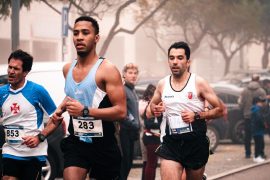Runner’s stomach, also known as exercise-induced gastrointestinal distress, refers to a range of digestive symptoms that some individuals experience during or after intense physical exercise, especially running or other endurance activities. I have often had these problems myself, especially during tough workouts. Here I bring you the best help for runner’s stomach in 2023.
What Causes a Runner’s Stomach?
Runner’s stomach is a common problem among athletes and runners, and the exact cause is not fully understood. Symptoms of a runner’s stomach can include abdominal pain, cramps, bloating, nausea, vomiting, diarrhoea or an urgent need to go to the toilet.
The severity and duration of symptoms can vary from person to person. There are several factors that can contribute to the development of a runner’s stomach:
- Blood flow diversion: During exercise, blood flow is diverted away from the gastrointestinal tract to supply oxygen and nutrients to the working muscles. This can lead to reduced blood flow to the stomach and intestines, leading to digestive problems.
- Mechanical stress: The repetitive effect of running can cause mechanical stress on the digestive organs, especially the stomach and intestines. This stress can lead to discomfort, cramps and other symptoms.
- Hormonal changes: Exercise triggers the release of various hormones, such as adrenaline, which can affect digestion. These hormonal changes can increase the sensitivity of the gastrointestinal tract or alter its normal function, leading to symptoms such as diarrhoea or nausea.
- Dietary factors: Consumption of certain foods or drinks before exercise can contribute to digestive problems. High-fiber, fatty or spicy foods and large meals eaten too close to exercise can increase the likelihood of developing a runner’s stomach. I have also found that high levels of caffeine and nicotine have an impact.
The Best Help For A Runner’s Stomach
In many cases, it is a matter of experimentation when it comes to solving problems with runner’s stomach. Personally, I always try to avoid eating indigestible food or large meals before a tough workout or race. If the training/competition takes place in the evening or late afternoon, I always eat a low-fat meal 4 hours before. In the morning, I am not as sensitive and can eat more normally.
A dietary supplement for runners that I can recommend for runner’s stomach is Silicea Gastrointestinal which is an entirely natural product based on silica gel.
It works like a sponge that absorbs liquid and encapsulates stomach acid, gases and pathogenic substances. The silica gel also forms a protective layer in the stomach and intestines.
Silicea Gastrointestinal is clinically tested and a medical device that can be used for all forms of stomach problems, acute stomach problems such as runny stomach and long-term problems such as IBS.
Silicea Gastrointestinal is also available in small practical sachets that are easy to carry when travelling or, why not, in a waist bag during the run/competition.
To manage or prevent a runner’s stomach, you can also try the following strategies, some of which I mentioned above:
- Allow time for digestion: Avoid eating large meals within a few hours before exercise. Instead, choose smaller, easily digestible snacks or meals that are low in fat and fiber.
- Stay hydrated: Proper hydration is important to support digestion. Drink enough fluids before, during and after exercise to prevent dehydration, but avoid excessive fluid intake immediately before or during intense activity.
- Experiment with dietary choices: identify specific foods or drinks that trigger symptoms and avoid them before exercise. It can be helpful to keep a food diary to track patterns and identify potential triggers.
- Gradually increase exercise intensity: Give your body time to adapt by gradually increasing the intensity and duration of your exercise sessions. This can help minimize the impact on your digestive system.
- Seek professional advice: If runner’s stomach persists or significantly interferes with your exercise routine, it is advisable to consult a healthcare professional. They can provide personalized advice and help rule out underlying conditions that may be contributing to the symptoms.
Remember that runner’s stomach affects individuals differently, so it may take some trial and error to find the strategies that work best for you. Good luck to you!







